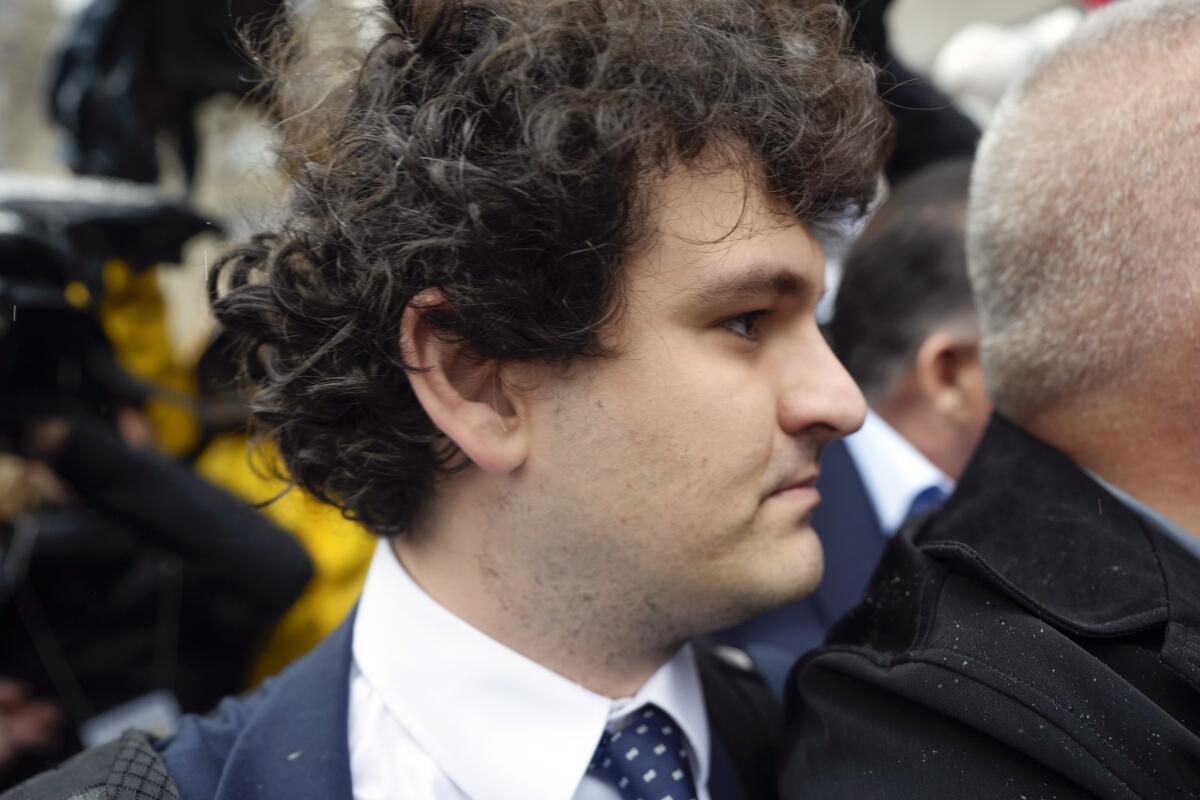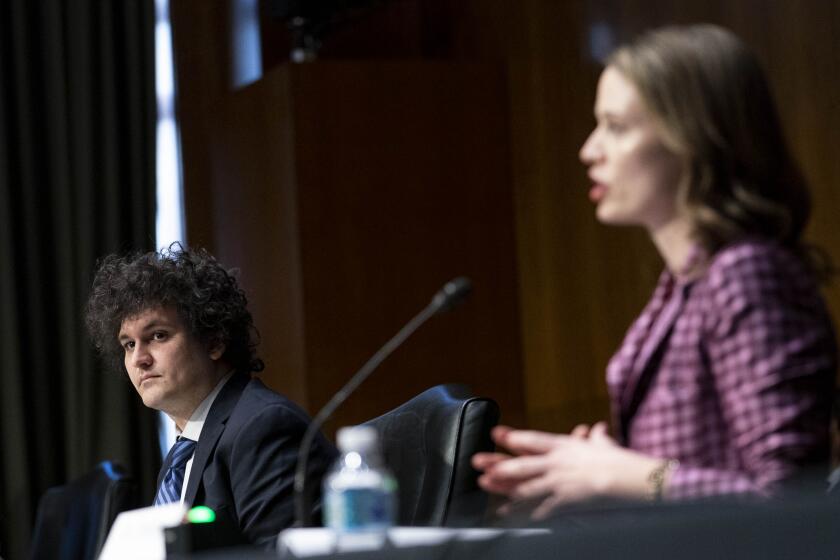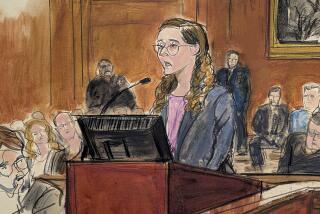Sam Bankman-Fried pleads not guilty to fraud in New York, faces trial in October

- Share via
FTX founder Sam Bankman-Fried pleaded not guilty to criminal charges Tuesday and ordered to face trial in October in a courtroom showdown likely to be one of the highest profile white-collar fraud cases in recent years.
Bankman-Fried appeared in U.S. District Court in New York wearing a blue suit, white shirt and blue tie, and sitting at the defense table between his lawyers, Mark Cohen and Christian Everdell. U.S. District Judge Lewis Kaplan set a trial date for Oct. 2, after federal prosecutors said they expect to produce all evidence for the case in the next four weeks.
While the plea was not unexpected, it buys the 30-year-old more time, legal experts say. Bankman-Fried will get a better idea on the evidence prosecutors have against him and plan his next move. The plea puts the case on track for a lengthy trial, which could last at least four weeks.
Bankman-Fried emerged from a black SUV into a crowd of photographers and TV crews Tuesday, ahead of a 2 p.m. hearing scheduled in New York. In December, U.S. prosecutors in Manhattan revealed eight criminal counts against him, including wire fraud and campaign finance violations.
The cryptocurrency billionaire employed several former regulators who aided his efforts to woo top CFTC officials, emails obtained by the Los Angeles Times show.
Additional bail condition
Assistant U.S. Atty. Danielle Sassoon summarized the evidence against Bankman-Fried, noting that from the beginning FTX had a unique relationship with Alameda that allowed it to receive preferential treatment. The U.S. proposed an addition bail condition for Bankman-Fried, asking to judge to prohibit him from accessing or transferring any FTX or Alameda Research assets.
The ask comes after Bloomberg News reported last week that federal prosecutors were looking into a series of crypto transactions tied to digital wallets associated with Bankman-Fried. Sassoon said there was not yet any evidence that the transfers reported last week were done by Bankman-Fried but that prosecutors were probing it.
“We do have concerns that within a period of a few days additional assets could become inaccessible,” Sassoon said, noting that while Bankman-Fried has denied making the transfers in a tweet he has made false statements in that fashion before.
A magistrate judge granted Bankman-Fried a $250-million bail package in December. Earlier Tuesday, Bankman-Fried asked U.S. District Judge Lewis Kaplan to keep confidential the identities of two people who will help him secure bail. Kaplan on Tuesday said he will grant the request pending motions by the press or any parties to make the names of the guarantors public. Prosecutors said they have appointments to interview both of the potential sureties for Bankman-Fried’s bail.
New task force
Manhattan U.S. Atty. Damian Williams, who is leading the Bankman-Fried case, announced on Tuesday the formation of a task force of senior prosecutors to handle the investigation and prosecuting matters related to the collapse, made up of members of units probing securities and commodities fraud, public corruption, money laundering and transnational criminal enterprises. The task force, which will use the office’s asset forfeiture and cyber capabilities to “trace and recover victim assets.”
Sam Bankman-Fried’s $16-billion fortune was always a myth. The mystery is why venture firms and the financial press thought it existed.
The group will be led by the office’s chief counsel, Andrea Griswold, who serves as a co-chief of the Securities and Commodities Fraud Task Force, and will be supervised by the heads of the securities and commodities fraud unit with consultation by the heads of the public corruption and money laundering and transnational criminal enterprise units.
“All the machinations of getting to trial will start rolling after the arraignment,” Andrew Jennings, a law professor and former white-collar defense attorney, said. “But it doesn’t mean the government and Bankman-Fried can’t negotiate a plea.”
Jennings, now a professor at Brooklyn Law School, said Bankman-Fried would likely be considering a plea bargain. Prosecutors may be willing to budge on the sentencing recommendations — the time they believe Bankman-Fried should spend in prison — they submit to a judge or to drop one or more charges.
“Even if you have a strong evidential case going to trial, it does carry some risks,” Jennings said. “If the case is going to take weeks, it does take a very serious commitment of government resources. So the government, in general, is always open to reaching some agreement if it avoids the cost of trial.”
Legal pathways
Pleading not guilty also opens up discovery channels. Bankman-Fried and his legal team will get a better insight into what evidence prosecutors have, including any exculpatory material.
Williams previously revealed the government had spoken to dozens of FTX employees and had tens of thousands of pages of material, including emails, financial statements and Signal messages.
The government’s star witnesses are some of Bankman-Fried’s closest associates — former Alameda Research Chief Executive Caroline Ellison and FTX Chief Technology Officer Gary Wang. They have pleaded guilty to fraud charges in cooperation agreements carved out with the government while Bankman-Fried was still in the Bahamas.
While negotiating a plea is one thing, Bankman-Fried’s overall value as cooperator is somewhat diminished by the fact he is at the top of the FTX hierarchy.
“Even if Bankman-Fried wanted to cooperate,” prosecutors “would only agree to do so if he brought substantial value,” defense attorney Tim Howard, a former federal prosecutor, said. “Fried is likely at the top of their pyramid, so it’s unlikely.”
Only a fraction of criminal cases in the U.S. end up going to trial. The FTX founder was arrested in the Bahamas on Dec. 12 after prosecutors filed an indictment accusing him of spearheading a years-long fraud through the cryptocurrency exchange.
Bankman-Fried fraudulently raised $1.8 billion from investors under the guise of FTX having appropriate controls and risk management measures, authorities allege. FTX’s catastrophic collapse in November and subsequent bankruptcy filing shattered trust in the cryptocurrency industry.
He also is accused of misusing FTX customers’ funds to cover personal expenses, real estate purchases and trading at Alameda Research, the hedge fund he established in 2017. In media interviews before his arrest, Bankman-Fried conceded being a poor manager with lapses in oversight but denied knowingly committing fraud.
He was extradited to the U.S. last month and released from custody on a $250-million bail package. He is also facing civil action from the Securities and Exchange Commission and Commodity Futures Trading Commission. Those cases will likely be paused while the criminal case plays out.
More to Read
Inside the business of entertainment
The Wide Shot brings you news, analysis and insights on everything from streaming wars to production — and what it all means for the future.
You may occasionally receive promotional content from the Los Angeles Times.












